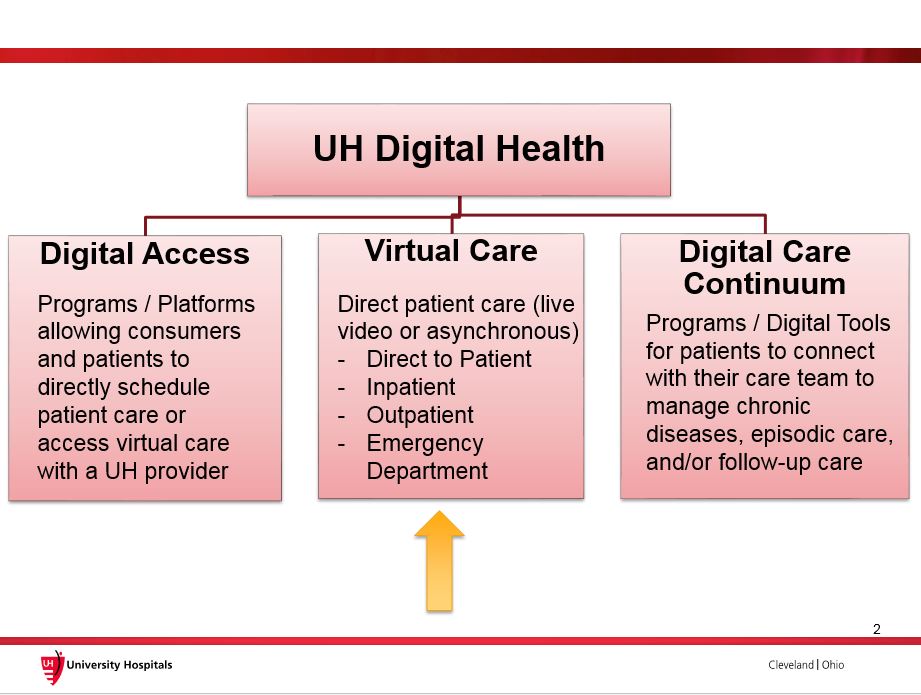University Hospitals Digital Health Initiatives in Ear, Nose & Throat
November 13, 2019
Virtual visits are increasing access to expert care
Innovations in Ear, Nose & Throat | Fall 2019
 Brian D'Anza, MD
Brian D'Anza, MD
Appointments are now available from the comfort of home for a select few post-surgical patients at University Hospitals Ear, Nose & Throat Institute. A pilot program is enabling surgeons to connect to patients in real time via a secure HIPAA-compliant video/audio link powered by MDLIVE, the nation’s largest provider of telemedicine connectivity.
"In individual cases where a full physical exam is not required, we are offering virtual visits through a secure platform,” says Brian D’Anza, MD, Division of Rhinology, Sinus and Skull Base Surgery and Lead, Innovation and Digital Health, UH Ear, Nose & Throat Institute, and Assistant Professor, Case Western Reserve University School of Medicine. “By extending our reach through internet and mobile device technology, our patients derive significant benefit, and their feedback has been overwhelmingly positive.”
Currently, virtual visits are offered to appropriately selected adult patients as follow-up to throat and neck procedures such as tonsillectomy, adenoidectomy or incisional biopsy in instances where sutures are unnecessary or absorbable. Surgeons connect to patients remotely, discuss their recovery, answer questions and complete a visual head and neck exam.
“Our goal is to save our patients the travel, hassle and cost associated with office visits,” says Dr. D’Anza. “Patients have loved the service thus far, and providers are able to decompress clinic time without sacrificing care standards.
EXPEDITING EMERGENCY CARE
Looking ahead, the UH Ear, Nose & Throat Institute is developing a novel program to connect emergency department physicians throughout the region to on-call ENT specialists via virtual visits routed through a central transfer line.
“Often, when patients present to the emergency department [ED] with ENT-related conditions, they are transported to main campus by ambulance or helicopter,” says Dr. D’Anza. “We are working to roll out a new model in the next few months that would enable our ENT physicians to communicate directly with patients and ED personnel and view relevant scans in real time.”
In addition to expediting ENT care in emergency situations, the new model would eliminate the cost and heartache patients and families incur with stressful hospital transfers.
SAME-DAY ACCESS TO ENT SERVICES
As access to medical specialists continues to pose a challenge nationally, patients sometimes wait weeks to be seen for ENT care. But in the near future, expert advanced nurse practitioners at UH Ear, Nose & Throat Institute will be able to connect online to treat otolaryngology-related conditions on the day the patient calls. They also will have the ability to triage patients with complications that require further care and expedite scheduling to connect individuals to the appropriate provider.
ECONOMY OF VIRTUAL CARE
As healthcare billing becomes increasingly fluid, most commercial insurance providers, as well as Medicaid, reimburse virtual visits for ED care if the expert is at least five miles away. While direct-to-consumer virtual visits typically are not covered, those restrictions are evolving. However, surgical follow-up visits often are not billed separately, making them an ideal entry point for digital innovation.
“By focusing on post-op patients for the initial pilot, we are able to improve care and convenience for our patients without having to do any cash charging,” says Dr. D’Anza.
Virtual visits can not only replicate traditional office visits but can also improve efficient care delivery and resource utilization. Advances in telemedicine have the potential to be especially impactful in managing chronic disease, as well as providing care in remote or rural areas where inequity of access is particularly troublesome.
“As we transition from a fee-based healthcare economy to value-driven care, digital health initiatives will be vital to staying ahead of the curve,” says Dr. D’Anza. “We are looking beyond the norm to make sure we are providing the best for our patients.
For more information on digital health initiatives within University Hospitals Department of Otolaryngology, contact Dr. D'Anza at 216-868-8943 or Brian.D’Anza@UHhospitals.org.


